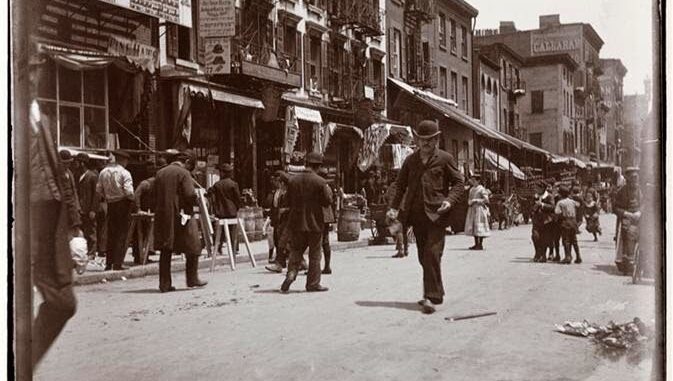
 Today marks the publication of the second of our top five stories, Marius Mazzeo’s “Shark Fishing.” Our judge said that this con artist story had a nice twist of irony and a coy reveal at the end. Enjoy!
Today marks the publication of the second of our top five stories, Marius Mazzeo’s “Shark Fishing.” Our judge said that this con artist story had a nice twist of irony and a coy reveal at the end. Enjoy!

I, a purposely unnamed author, tell this story nearly one year after these events occurred. A story of a man named Allen Leach, who ten years ago today was sitting on his sofa after a meeting with a client. He was a very successful lawyer, who, despite his journey to this position, was unchanged from his old ways. His methods of business were the same, but his position was different. He was now more powerful, his duty being to “preserve the law.” However, his ideas about “preservation” were different from most as he did not see a forever balanced scale, but one that could be tipped. On this day, there was a knock on the door, causing a seemingly disgruntled Allen to forget that his cup was resting next to his foot which was on the coffee table. His next action caused it to fall to the floor, hitting the rug but not shattering. He put it back in its place and answered the door. His next jolt was much worse than the coffee cup incident as he was dragged out of his house by two policemen after opening the door. What happened to Mr. Leach was easily foreseen. Weight was removed from the heavier side and balance was restored. Mr. Leach has since returned to society, a shell of a man working in a local coffee shop. This story does not start from the very beginning, but just far back enough to see his progression. Starting in the neighborhood of Hester Street, Manhattan, a series of events begin that are all relevant to the making and undoing of this man.
“See that man over there?” Gusto said to Marvin as they were waiting for the disheveled man behind the counter to finish making their coffees.
“Yeah,” replied Marvin. “Should we do him next?”
“Of course! Anyone that wears clothes like that must pay well. And to find someone like that in a place like this. . . it’s free money,” Gusto replied just as the man behind the counter grumbled the price of the coffee.
“Alright let’s do it,” replied Marvin.
They sat at the table behind the wealthy man, close enough for him to hear their conversation. Gusto took out a regular Indian head penny. But this one was different. It was a fake with the head pointing to the right instead of the left.
He started, “Say, You know why this Indian head is pointing to the right instead of the left?”
“No,” Marvin answered.
“Well, it’s because one man in the government secretly changed the direction of the head so it pointed to the East instead of the West. He was a tryin’ to make a statement.”
“Is that so?” Marvin responded.
“Yes, he wanted to prove a point that the Indians should look east and change their ways to civilization.” he replied. “Well, they went on and fired him anyway, only leavin’ one-hundred made.”
“How much is it worth?”
He started to whisper as the man behind Marvin apparently began to eavesdrop.
“I think it’s around thirty dollars.” Gusto whispered.
“No way,” Marvin said. “That isn’t real.”
The man behind them shifted, obviously eavesdropping.
“‘Course it is!” countered Gusto. “Fine, I’m going outside to have a smoke. You coming?”
“Ha! Not after you just tried to make a fool out of me.”
“Suit yourself.” Gusto said, leaving the shop.
A little while later, a man wearing large spectacles, a moustache, hat, and large overcoat entered. It was Gusto, the “pawn shop owner.” He pretended to be surprised to see Marvin sitting there and went over to greet him.
“Say,” Marvin said, “there was a man that had a coin with the Indian head pointing in the other direction or something like that, said it was worth a lot.
The “expert” was bewildered. “Of course,” he replied in a deep, scratchy voice. “Probably worth about sixty!”
They finished their conversation, as the “expert” left to attend an emergency.
A little while later, Gusto was back.
“Alright, how about this, I’ll give you twenty-five for it,” said Marvin.
“Sold!” yelled Gusto.
Just then the man behind them turned around.
“Twenty-five!, ha!, you are being played by your friend here! I’ll give you forty for it.” Now he was hooked.
“I’ll give you forty-five for it, take it or leave it!” Marvin replied.
“Fifty,” the man interjected, “Fifty whole dollars!”
“Sold!” Gusto exclaimed.
The man wrote the check. Gusto took it.
“What are you nosing into our business for!” said Marvin, seeming to be angry.
The man gathered his briefcase and sped out of the coffee joint, glancing victoriously at Marvin. When he was out of sight, the two men celebrated, splitting the day’s earnings. Watching the excitement from another table was a slim man in his fifties, with wispy white hair and spectacles. He wore a worn out suit, with a weight balance embroidered on his jacket. Something was peculiar about this symbol, however. It seemed as though the balance was shifted, as if something heavier was placed on the left side. He rose from his chair, tipped the server, and strode out of the store. However, one must note that a seemingly unimportant event occurred on his way out. He seemed to make contact with Marvin as his path of exit seemed to fatefully bring him to that position. It seemed to not be worthwhile to bring up, as this contact was no more than a sort of breeze ruffling Marvin’s jacket. Certainly no party in the shop seemed to notice such a minute detail, or if they did, think more than a moment about it. Certainly no one noticed this man with the strange symbol stitched to his jacket slip something into Marvin’s jacket pocket as he made his way out of the small cafe on to the crowded Hester Street.
The object placed in Marvin’s pocket was not noticed until a week after this event. Marvin’s apartment was in a dilapidated tenement building that was always noisy, hot in the summer, and cold in the winter. Reaching into his pocket for cash when his landlord was furiously knocking at his door while demanding that month’s rent, he discovered a note. It was a note with an opportunity to begin an apprenticeship in law with Callahan, a local lawyer. Callahan was well-known in the neighborhood. A flamboyant character who heavily advertised in the newspapers and often cut corners. He was, as most people called him, “slick,” as he was able to talk his way out of anything. He would often conduct set-ups with many of the shifty people in the neighborhood, gaining their business by staging an “accident” and suing the target. However, this was not his main line of business. More mysteriously, his other business involved working with certain “bosses” and company owners to help them commit fraud. Of what kind or magnitude, no one knows. As Marvin walked into this ominous brick of a building, he was greeted by Callahan himself who took him into his office. The office was lined with bookshelves, with one window behind Callahan’s large oak desk and throne-like chair. He fixed his spectacles and began.
“I wanted you here because I saw potential in you,” he said. “Potential that can be put to work here at Callahan Meyer.” Callahan Meyer was the name of the firm. Meyer, who had since disappeared, was the founder of the firm, hiring Callahan to be his partner at law. Although the firm had grown in employees, it still maintained a mysterious presence in the neighborhood. He continued, “I see what you do on the streets, that. . . business. I want to give you a new opportunity. One that will focus your skill on. . . on doing what’s right for the law.”
Marvin answered surprised, “You want me to be a lawyer?”
“Yes. You will be trained personally by me and put on a partner track. I’m getting old and need someone to guide the future of this firm.”
“And you want me?” replied Marvin.
“Yes. Look, this business can turn your life around. You know the law well my friend. . . with your business and all. But you can’t do that forever. You need to at least appear to be on the right side of it.”
Marvin walked towards his home, confused. He thought about this strange opportunity that was given to him. This opportunity to somehow control the law. He knew he needed a change, but this? Just then, he ran into Gusto who appeared out of the moonlight from an alley. He was swinging a fake watch on his finger.
“Say” he said, “Let’s do the old trick. It’s the perfect time for it.”
“No, it’s been an exhausting day and I need sleep” replied Marvin. “Maybe tomorrow.”
“C’mon let’s do it. It’ll be quick.”
A man rounded the corner.
“Fine. . . let’s do it.”
Gusto placed the watch on the sidewalk around the corner. Just when a man rounded it he picked it up remarking out loud, “Wow! A gold watch just left here like this!” He put it on. The man stopped and looked.
“How much money do you want for it?” he asked in a husky voice.
“Forty dollars” said Gusto.
“Alright” said the man, “here it is.”
That was the quickest transaction Gusto ever made. Marvin did not need to verify the cost, the man just paid.
After the money and watch were exchanged, Marvin heard shots ring out. He waited in the alley, and upon hearing nothing more, emerged to find Gusto dead. All of the money was gone.
Three years later, Marvin was in his office placing the final touches on a transaction with a client.
“So your solution is simple. All you do is start multiple corporations. . . in layers”
“Layers?”
“Yes, in layers.”
“What’s a layer.”
“Just make other corporations that own Syndicate Trust.”
“Understood. . . continue.”
“Make each company that you start make a commision on work.”
“What type of work?”
Marvin stared at the man blankly, shaking his head furiously, “Any work!”
“Then?”
“What?”
“After any work.”
Marvin peered at him over the top of his spectacles, saying as calmly as he could, “Then make Syndicate Trust pay you a salary as an employee.”
“I like the sound of it.”
“That’s just great. . . and it looks like our time is up. . .” Marvin said, raising his eyebrows with an outstretched hand.
“Yes, of course” the man said. “And I write this too?”
“Marvin Mason”
“Alright, here you go sir, have a splendid afternoon.”
“You as well.”
As the man left, he could not help but to glance for a moment at the tipped scale engraved on the wall while putting on his overcoat and disappearing out the door.
It was a perfect morning in New York, as the story moves ahead nearly six years. As usual, Marvin woke at eight in the morning to have his coffee and read the newspaper in his silk pajamas. He left his house, a monstrosity of twenty thousand square feet, to go work at Callahan Meyer Mason. However, when he arrived in his protected caravan, as the neighborhood was not filled with the highest quality people and Callahan insisted the firm stay in the same building, he noticed something different. There was a police car casually stopped, hidden in the bustle of factory workers. He looked in the other direction and saw two more pulling to a stop near the firm’s building. Quickly, Marvin ordered his driver to bring him home. Three days later, he set up shop in Chicago working under the name of Allen Leach. He had invited his first client to his house, and upon finishing with this client, moved from the office to his sofa. He sat there for an hour until he heard a knock at the door. Now, I have described to you how this man came from nowhere to disrupt the balance in the law. How such a man became the most well-known lawyer on the East coast. An example of misplaced power, like that of a monkey with a machine gun. As my job is done, I’m sure now you will be able to fill in the rest.
